MARKETING
25+ New, Newly Updated, and Timeless Books Content Marketers Love
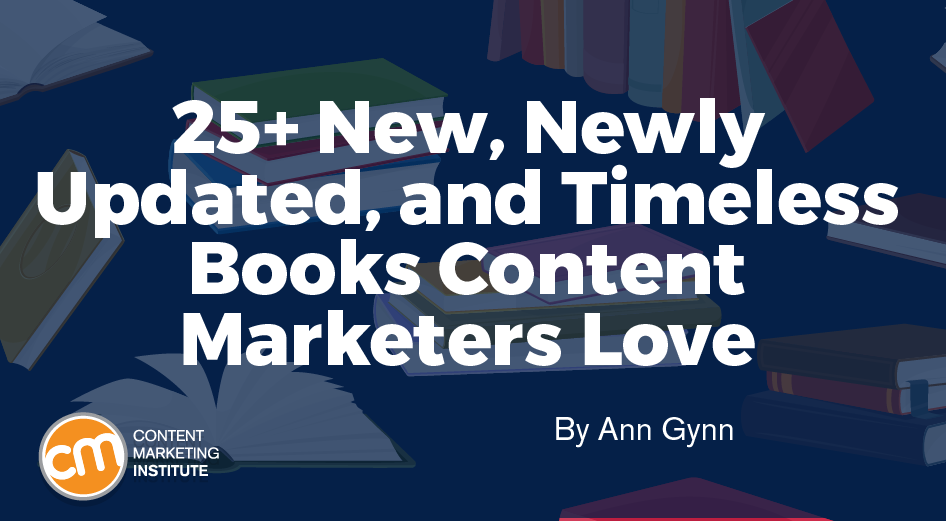
Content marketers love their books.
That’s apparent year after year when Content Marketing Institute compiles its holiday gifting list.
It was also apparent to anyone who saw the long line of Content Marketing World attendees waiting to get an autographed copy of Ann Handley’s new release. No surprise, the second edition of Everybody Writes was the most nominated tome on the list.
Whether you’re giving a gift or needing some titles to add to your wish list, consider these 25 options – seven published in 2022 – recommended by your peers in the #CMWorld Slack channel and on LinkedIn.
The books on the list aren’t about content marketing only. They also cover creativity, writing, personal branding, and other topics sure to inspire, motivate, and teach marketers who are all about content.
Each entry includes an excerpt from the Amazon description and a comment (if provided) by the recommender.
Make short work of your team gifting with this list of new and timeless books recommended by #ContentMarketing pros via @AnnGynn and @CMIContent. Click To Tweet
Recommendations for new and newly updated books
Content Chemistry: The Illustrated Guide to Content Marketing (2022), by Andy Crestodina
 From the Amazon description: The result of thousands of conversations about web marketing with hundreds of companies, this handbook is a compilation of the most important and effective lessons and advice about the power of search engine optimization, social media, and email marketing.
From the Amazon description: The result of thousands of conversations about web marketing with hundreds of companies, this handbook is a compilation of the most important and effective lessons and advice about the power of search engine optimization, social media, and email marketing.
Recommended by Heidi Cohen, chief marketing officer, Actionable Marketing Guide: “This book is a textbook for several graduate programs. Andy quietly updates it so that it’s up to its sixth edition.”
Also recommended by Sarah Mitchell, founder, Typeset, and Rachel Duthie, communications specialist, Shearer’s Foods.
The Content Puzzle and the Missing Piece (2022), by Andi Robinson
 From the Amazon description: “The content itself is one part of content marketing, but in many respects, it is not the most important. Before you start thinking about what types of content you need to create, you need to lay the groundwork. Think of this as the edge of the puzzle that holds the whole picture together. As you will learn, there are a lot of steps that you need to take into consideration before you get to the actual creation of content.”
From the Amazon description: “The content itself is one part of content marketing, but in many respects, it is not the most important. Before you start thinking about what types of content you need to create, you need to lay the groundwork. Think of this as the edge of the puzzle that holds the whole picture together. As you will learn, there are a lot of steps that you need to take into consideration before you get to the actual creation of content.”
Recommended by Jeremy Bednarski, content strategist, Salesforce: “Not only does Andi provide you with the basics to understand the pieces of the content puzzle, but she brings the psychological aspect to help you take your content strategy to the next level.”
Everybody Writes: Your New and Improved Go-To Guide to Creating Ridiculously Good Content (2022), by Ann Handley
 From the Amazon description: In this brand-new edition, Ann delivers all the practical, how-to advice and insight you need for the process and strategy of content creation, production, and publishing.
From the Amazon description: In this brand-new edition, Ann delivers all the practical, how-to advice and insight you need for the process and strategy of content creation, production, and publishing.
Recommended by Rachel Duthie, communications specialist, Shearer’s Foods: “The content marketing bible.”
Also recommended by Michelle Garrett, founder, Garrett Public Relations; Jeremy Bednarski, content strategist, Salesforce; Danielle Love, content marketing strategist, AmerisourceBergen; Heidi Cohen, chief marketing officer, Actionable Marketing Guide; Gina Balarin, founder, Verballistics; and Michelle Araiza, senior global marketing manager, demand generation, IQVIA.
I’m Not a Copywriter, But …: Lessons Learned from a Late Bloomer (2022), by Joshua Womack
 From the Amazon description: Stand-up comedy. Speechwriting. Pro wrestling? Somehow, these oddball life choices led Josh Womack to copywriting. In his debut book, he talks about these experiences and more.
From the Amazon description: Stand-up comedy. Speechwriting. Pro wrestling? Somehow, these oddball life choices led Josh Womack to copywriting. In his debut book, he talks about these experiences and more.
Recommended by Jeremy Bednarski, content strategist, Salesforce: “If you’re a writer who needs some tips or inspiration, this book is full of them. Josh made his way to copywriting by way of stand-up comedy and shares stories about how he found his way.”
Lights, Camera, Impact: Storytelling, Branding, and Production Tips for Engaging Corporate Videos (2022), by Tony Gnau
 From the Amazon description: Make every video-production dollar count with Tony’s short storytelling tips for digital marketing and internal communication professionals. You’ll learn DIY shooting suggestions for work you do without the video pros. This guide gives you the insights from top thought leaders in corporate communication in order to create a solid video-marketing plan.
From the Amazon description: Make every video-production dollar count with Tony’s short storytelling tips for digital marketing and internal communication professionals. You’ll learn DIY shooting suggestions for work you do without the video pros. This guide gives you the insights from top thought leaders in corporate communication in order to create a solid video-marketing plan.
Recommended by Lisa Dougherty, director, blog operations and community, Content Marketing Institute: “Tony’s book is for anyone wanting to create exceptional video content. His guide is filled with helpful information so you can finally create your video marketing strategy.”
Making Numbers Count: The Art and Science of Communicating Numbers (2022), by Chip Heath and Karla Starr
 From the Amazon description: Making Numbers Count outlines specific principles that reveal how to translate a number into our brain’s language. This book is filled with examples of extreme number makeovers, vivid before-and-after examples that take a dry number and present it in a way that people click in and say, ‘Wow, now I get it!’
From the Amazon description: Making Numbers Count outlines specific principles that reveal how to translate a number into our brain’s language. This book is filled with examples of extreme number makeovers, vivid before-and-after examples that take a dry number and present it in a way that people click in and say, ‘Wow, now I get it!’
Recommended by George Stenitzer, founder and chief content officer, Crystal Clear Communications: “It will enable you to communicate numbers without confusing your audience, who may or may not understand fractions and percentages. This improves your content and your results reporting. You can read my in-depth review of the book on my blog.”
Prove It: Exactly How Modern Marketers Earn Trust (2022), by Melanie Diezel
 From the Amazon description: Using real-world examples from trusted brands across dozens of industries, they’ll walk you step-by-step through the process of identifying and categorizing your business promises – even the ones you don’t realize you’re making – gathering the right evidence and backing up each style of claim.
From the Amazon description: Using real-world examples from trusted brands across dozens of industries, they’ll walk you step-by-step through the process of identifying and categorizing your business promises – even the ones you don’t realize you’re making – gathering the right evidence and backing up each style of claim.
Recommended by Andi Robinson, consultant, Hijinx Marketing: “Consumers are savvy about marketing. We can no longer make claims that we can’t back up with proof. Melanie lays out a roadmap for how companies can show their audience why they should buy their products or services. The easy-to-read format, with commentary from Phil Jones, should be on every marketer’s bookshelf.”
Using Behavioral Science in Marketing: Drive Customer Action and Loyalty Prompting Instinctive Responses (2022), by Nancy Harhut
 From the Amazon description: The book shows how to apply behavioral science principles in key areas of marketing, including marketing communications, email, direct mail and ad campaigns, social media marketing and sales funnel conversion strategies. Highly practical and accessible, it includes case studies and examples from AT&T, Apple, Spotify, and The Wall Street Journal.
From the Amazon description: The book shows how to apply behavioral science principles in key areas of marketing, including marketing communications, email, direct mail and ad campaigns, social media marketing and sales funnel conversion strategies. Highly practical and accessible, it includes case studies and examples from AT&T, Apple, Spotify, and The Wall Street Journal.
Recommended by Shubhangi Mittal, founder, Blackboard-Digital: “It lists real-time examples where Nancy and her team have used proven behavioral science principles to influence decision-making.”
Also recommended by Jeremy Bednarski, content strategist, Salesforce, and Danielle Love, content marketing strategist, AmerisourceBergen.
Recommendations for timeless books
Bird by Bird: Some Instructions on Writing and Life (1994), by Anne Lamott
 From the Amazon description: With this basic instruction always in mind, Anne Lamott returns to offer … a step-by-step guide on how to write and on how to manage the writer’s life. Bracingly honest, she is also one of the funniest people alive.
From the Amazon description: With this basic instruction always in mind, Anne Lamott returns to offer … a step-by-step guide on how to write and on how to manage the writer’s life. Bracingly honest, she is also one of the funniest people alive.
Recommended by Danielle Love, content marketing strategist, AmerisourceBergen: “This book reminds us that writing is a journey. If we truly savor all the steps along the way, we will create a richer experience for ourselves and our readers.”
Building a Story Brand (2017), by Donald Miller
 From the Amazon description: Donald Miller teaches marketers and business owners to use the seven universal elements of powerful stories to dramatically improve how they connect with customers and grow their businesses.
From the Amazon description: Donald Miller teaches marketers and business owners to use the seven universal elements of powerful stories to dramatically improve how they connect with customers and grow their businesses.
Recommended by Hanush Kumar, content and brand marketer, Kissflow: “He gives a seven-step framework to write compelling stories and offers adequate examples. Once you know the framework, it is likely that every movie becomes pretty much predictable.”
Buyer Personas: How To Gain Insight Into Your Customer’s Expectations, Align Your Marketing Strategies, and Win More Business (2015), by Adele Revella
 From the Amazon description: This book provides comprehensive coverage of a compelling new way to conduct buyer studies, plus practical advice on adopting the buyer persona approach to measurably improve marketing outcomes. Readers will learn how to segment their customer base, investigate each customer type, and apply a radically more relevant process of message selection, content creation, and distribution through the channels that earn the buyers’ trust.
From the Amazon description: This book provides comprehensive coverage of a compelling new way to conduct buyer studies, plus practical advice on adopting the buyer persona approach to measurably improve marketing outcomes. Readers will learn how to segment their customer base, investigate each customer type, and apply a radically more relevant process of message selection, content creation, and distribution through the channels that earn the buyers’ trust.
A new edition with co-author Jim Kraus debuts in late 2023.
Recommended by Sarah Mitchell, founder, Typeset: “The whole book is good, but she has a fantastic section on interviewing and extracting information from buyers.”
The Content Fuel Framework: How To Generate Unlimited Story Ideas (2020), by Melanie Diezel
 From the Amazon description: This simple framework catalyzes the brainstorming process, making idea generation effortless and nearly automatic. No more writer’s block. No more asking, “what should I post?” No more waiting for that “big idea” to show up in its own time. This system allows storytellers from any industry to produce fresh story ideas on demand, at any time.
From the Amazon description: This simple framework catalyzes the brainstorming process, making idea generation effortless and nearly automatic. No more writer’s block. No more asking, “what should I post?” No more waiting for that “big idea” to show up in its own time. This system allows storytellers from any industry to produce fresh story ideas on demand, at any time.
Recommended by Daniel Foley, founder, Daniel Foley SEO: “Her book provides a straightforward structure for idea-generating and brainstorming that can help you develop a marketing strategy. The book is organized around a matrix with 10 distinct ‘focuses’ and 10 distinct ‘formats’ at its core. The approach in this book enables digital marketers, content producers, and anybody else who interacts with an audience to regularly deliver original new content.”
Also recommended by Danielle Love, content marketing strategist, AmerisourceBergen.
Content, Inc.: Start a Content-First Audience, Build a Massive Audience, and Become Radically Successful (With Little or No Money) (2021), by Joe Pulizzi
 From the Amazon description: Content Inc. provides an ingenious approach to business based on a profoundly simple concept: Having a singular focus on the audience, and building a loyal audience directly, provide the best, most nuanced understanding of what products ultimately make the most sense to sell.
From the Amazon description: Content Inc. provides an ingenious approach to business based on a profoundly simple concept: Having a singular focus on the audience, and building a loyal audience directly, provide the best, most nuanced understanding of what products ultimately make the most sense to sell.
Recommended by Heidi Cohen, chief marketing officer, Actionable Marketing Guide: “Here’s a great author interview.”
Also recommended by Karine Abbou, founder, Marketing Leaders, and Rachel Duthie, communications specialist, Shearer’s Foods.
Don’t Make Me Think, Revisited: A Common Sense Approach to Web Usability (2013), by Steve Krug
 From the Amazon description: It’s the guide to help … understand the principles of intuitive navigation and information design. Witty, commonsensical, and eminently practical, it’s one of the best-loved and most recommended books on the subject … And it’s still short, profusely illustrated … and best of all – fun to read.
From the Amazon description: It’s the guide to help … understand the principles of intuitive navigation and information design. Witty, commonsensical, and eminently practical, it’s one of the best-loved and most recommended books on the subject … And it’s still short, profusely illustrated … and best of all – fun to read.
Recommended by Jennifer Best, vice president, marketing, All American Entertainment Speakers Bureau: “We should always use language that’s compatible with the reader’s level of understanding while staying as simple as possible to get our point across.”
Epic Content Marketing: How To Tell a Different Story, Break Through the Clutter, and Win More Customers by Marketing Less (2013), by Joe Pulizzi
 From the Amazon description: This book takes you step by step through the process of developing stories that inform and entertain and compel customers to act – without actually telling them to. Epic content, distributed to the right person at the right time, is how to truly capture the hearts and minds of customers. It’s how to position your business as a trusted expert in its industry. It’s what customers share and talk about.
From the Amazon description: This book takes you step by step through the process of developing stories that inform and entertain and compel customers to act – without actually telling them to. Epic content, distributed to the right person at the right time, is how to truly capture the hearts and minds of customers. It’s how to position your business as a trusted expert in its industry. It’s what customers share and talk about.
A new edition with co-author Brian Piper debuts March 7, 2023.
Recommended by Paul Somerville, editor-in-chief, Electric Scooter Guide: “Joe Pulizzi, a content marketing expert, demonstrates how to captivate potential clients by producing content that they actually want to engage in. Fortune Magazine listed Epic Content Marketing as one of the five must-read books.”
Also recommended by Rachel Duthie, communications specialist, Shearer’s Foods.
How to be Great at Your Job: Get Things Done. Get the Credit. Get Ahead., (2018) by Justin Kerr
 From the Amazon description: From an author who climbed to the top of the corporate ladder before reaching age 40, this book takes the guesswork out of career success and breaks down what it takes to excel at your job.
From the Amazon description: From an author who climbed to the top of the corporate ladder before reaching age 40, this book takes the guesswork out of career success and breaks down what it takes to excel at your job.
Recommended by Rachel Duthie, communications specialist, Shearer’s Foods: “Not a content marketing book. However, Justin has some great tips everyone could learn.”
Known: The Handbook for Building and Unleashing Your Personal Brand in a Digital Age, (2017) by Mark Schaefer
 From the Amazon description: In today’s world, there is a permanent advantage to becoming known in your field. Those who are known get the customers, the better jobs, and invitations to exclusive opportunities. But can anybody become known? This path-finding book provides a step-by-step plan followed by the most successful people in diverse careers like banking, education, real estate, construction, fashion, and more.
From the Amazon description: In today’s world, there is a permanent advantage to becoming known in your field. Those who are known get the customers, the better jobs, and invitations to exclusive opportunities. But can anybody become known? This path-finding book provides a step-by-step plan followed by the most successful people in diverse careers like banking, education, real estate, construction, fashion, and more.
Recommended by Karine Abbou, founder, Marketing Leaders: “I do think personal branding will soon be the only marketing that is left – and to build a strong personal brand without a massive content strategy is nearly impossible.”
Made to Stick: Why Some Ideas Die and Others Thrive (2007), by Chip & Dan Heath
 From the Amazon description: The authors reveal the anatomy of ideas that stick and explain ways to make ideas stickier, such as applying the human scale principle, using the Velcro Theory of Memory, and creating curiosity gaps. Along the way, we discover that sticky messages of all kinds – from the infamous ‘kidney theft ring’ hoax to a coach’s lessons on sportsmanship to a vision for a new product at Sony – draw their power from the same six traits.
From the Amazon description: The authors reveal the anatomy of ideas that stick and explain ways to make ideas stickier, such as applying the human scale principle, using the Velcro Theory of Memory, and creating curiosity gaps. Along the way, we discover that sticky messages of all kinds – from the infamous ‘kidney theft ring’ hoax to a coach’s lessons on sportsmanship to a vision for a new product at Sony – draw their power from the same six traits.
Recommended by Laura Bakopolus Goldstone, senior director of communications and branding strategy, AdDaptive Intelligence: “It’s not brand new but has provided a fantastic framework for making content marketing simple, clear, relevant, concrete, and sticky.”
Obviously Awesome: How to Nail Product Positioning so Customers Get It, Buy It, Love It (2019), by April Dunford
 From the Amazon description: This book shows you how to find your product’s ‘secret sauce’ – and then sell that sauce to those who crave it. Having spent years as a startup executive (with 16 product launches under her belt) and a consultant (who’s worked on dozens more), the author speaks with authority about breaking through the noise of a crowded market.
From the Amazon description: This book shows you how to find your product’s ‘secret sauce’ – and then sell that sauce to those who crave it. Having spent years as a startup executive (with 16 product launches under her belt) and a consultant (who’s worked on dozens more), the author speaks with authority about breaking through the noise of a crowded market.
Recommended by Heidi Cohen, chief marketing officer, Actionable Marketing Guide: “This book shows people how to implement positioning. It’s a new classic. Without understanding this, the rest of your marketing strategy and content aren’t aligned.”
On Writing: A Memoir of the Craft (2000), by Stephen King
 From the Amazon description: Part memoir, part master class by one of the bestselling authors of all time, this superb volume is a revealing and practical view of the writer’s craft, comprising the basic tools of the trade every writer must have.
From the Amazon description: Part memoir, part master class by one of the bestselling authors of all time, this superb volume is a revealing and practical view of the writer’s craft, comprising the basic tools of the trade every writer must have.
Recommended by Michelle Garrett, founder, Garrett Public Relations: “His personal stories and practical advice make the one a must-read for any writer.”
Practical Content Strategy & Marketing: The Content Strategy & Marketing Course Guidebook (2017), by Julia McCoy
 From the Amazon description: This book lays the ‘hows’ of content marketing and strategy out, in a step-by-step approach, book form. Each section has written exercises built to solidify what you’re reading and learning – you’ll be able to fill these out with a pen.
From the Amazon description: This book lays the ‘hows’ of content marketing and strategy out, in a step-by-step approach, book form. Each section has written exercises built to solidify what you’re reading and learning – you’ll be able to fill these out with a pen.
Recommended by Alex Armstrong-Paling, managing director, ToolFit: “Finally, a practical, real-world guide to content marketing is available with built-in exercises to strengthen and expand understanding and learning. The author exhorts you to understand the operational idea that forms the cornerstone of marketing and strategy.”
Also recommended by Rachel Duthie, communications specialist, Shearer’s Foods.
RE:Think Innovation: How the World’s Most Prolific Innovators Come Up With the Great Ideas That Deliver Extraordinary Outcomes (2021), by Carla Johnson
 From the Amazon description: This book answers the question of how to tie individual competence with innovation techniques to direct corporate outcomes. It shows how to create a unified, idea-driven employee base that delivers more ideas in a shorter amount of time.
From the Amazon description: This book answers the question of how to tie individual competence with innovation techniques to direct corporate outcomes. It shows how to create a unified, idea-driven employee base that delivers more ideas in a shorter amount of time.
Recommended by Jeremy Bednarski, content strategist, Salesforce: “For marketers looking to get out of a creativity rut or getting past ‘this is how we always do things,’ Carla outlines a process to apply new ideas. By better capturing everything we observe, you’ll learn how to apply it to get to new ideas that help you reach your marketing goals.”
Also recommended by Danielle Love, content marketing strategist, AmerisourceBergen.
The Secret Army: Leadership, Marketing and the Power of People (2017), by Gina Balarin
 From the Amazon description: Bringing together beautifully told stories, real-life examples, thorough research and the wisdom of credible business leaders, authors and thinkers, this book dives beneath the surface of modern corporate life to expose the hidden humanness that drives us.
From the Amazon description: Bringing together beautifully told stories, real-life examples, thorough research and the wisdom of credible business leaders, authors and thinkers, this book dives beneath the surface of modern corporate life to expose the hidden humanness that drives us.
Self-nomination by Gina Balarin: “It contextualizes the power of communication in our workplaces, with an emphasis on how our ‘secret army’ (spoiler alert: customers, leaders, and employees) can make work meaningful and, quite frankly, better.”
What Great Brands Do: The Seven Brand-Building Principles That Separate the Best From the Rest, (2014) by Denise Lee Yohn
 From the Amazon description: Delivering a fresh perspective, this book teaches an innovative brand-as-business strategy that enhances brand identity while boosting profit margins, improving company culture, and creating stronger stakeholder relationships. Drawing from 25 years of consulting work with such top brands as Frito-Lay, Sony, Nautica, and Burger King, the author explains key principles of her brand-as-business strategy.
From the Amazon description: Delivering a fresh perspective, this book teaches an innovative brand-as-business strategy that enhances brand identity while boosting profit margins, improving company culture, and creating stronger stakeholder relationships. Drawing from 25 years of consulting work with such top brands as Frito-Lay, Sony, Nautica, and Burger King, the author explains key principles of her brand-as-business strategy.
Recommended by Rachel Duthie, communications specialist, Shearer’s Foods
Writing Without Bullshit: Boost Your Career by Saying What You Mean (2013), by Josh Bernoff
 From the Amazon description: In this practical and witty book, you’ll learn to front-load your writing with pithy titles, subject lines, and opening sentences. You’ll acquire the courage and skill to purge weak and meaningless jargon, wimpy passive voice, and cowardly weasel words. And you’ll get used to writing directly to the reader to make every word count. At the center of it all is the iron imperative: treat the reader’s time as more valuable than your own.
From the Amazon description: In this practical and witty book, you’ll learn to front-load your writing with pithy titles, subject lines, and opening sentences. You’ll acquire the courage and skill to purge weak and meaningless jargon, wimpy passive voice, and cowardly weasel words. And you’ll get used to writing directly to the reader to make every word count. At the center of it all is the iron imperative: treat the reader’s time as more valuable than your own.
Recommended by Danielle Love, content marketing strategist, AmerisourceBergen: “This author urges you to think critically about clarity in your writing. What is the true message hidden behind the corporate-speak and how can you make it more evident for your readers?”
Youtility: Why Smart Marketing Is About Help, Not Hype, (2013), by Jay Baer
 From the Amazon description: Drawing from real examples of companies who are practicing Youtility as well as his experience helping more than seven hundred brands improve their marketing strategy, the author provides a groundbreaking plan for using information and helpfulness to transform the relationship between companies and customers.
From the Amazon description: Drawing from real examples of companies who are practicing Youtility as well as his experience helping more than seven hundred brands improve their marketing strategy, the author provides a groundbreaking plan for using information and helpfulness to transform the relationship between companies and customers.
Recommended by Mike Myers, senior consultant, CEO stakeholder and integrated executive communications, Nationwide: “I got my start in content marketing because of this book. The mix of sound advice and practical, real-world examples helped me understand this ‘new’ thing (which, of course, wasn’t new at all) so clearly and inspired me to get involved!”
Even more book ideas
If you’re still shopping for just the right book, consider these additional recommendations mentioned by readers last year:
- AI for Marketers: An Introduction and Primer, third edition (2021), by Christopher Penn
- Brand Bewitchery: How to Wield the Story Cycle System to Craft Spellbinding Stories for Your Brand (2020), by Park Howell
- Break The Wheel: Question Best Practices, Hone Your Intuition, and Do Your Best Work (2018), by Jay Acunzo
- Company of One: Why Staying Small is the Next Big Thing for Business (2019), by Paul Jarvis
- Everyone Is an “Influencer”: Building a Brand by Engaging The People Who Matter Most (2021), by Kelly Keenan
- Find Your Red Thread: Make Your Big Ideas Irresistible (2021), by Tamsen Webster
- Lost and Founder: A Painfully Honest Guide to the Startup World (2018), by Rand Fishkin
- Meander, Spiral, Explode: Design and Pattern in Narrative (2019), by Jane Alison
- The Power of Moments: Why Certain Experiences Have Extraordinary Impact (2017), by Chip and Dan Heath
- You’re Not Listening: What You’re Missing and Why It Matters (2020), by Kate Murphy
What book would you add to this list? Tell us in the comments below.
HANDPICKED RELATED CONTENT:
Cover image by Joseph Kalinowski/Content Marketing Institute
MARKETING
Effective Communication in Business as a Crisis Management Strategy

Everyday business life is full of challenges. These include data breaches, product recalls, market downturns and public relations conflicts that can erupt at any moment. Such situations pose a significant threat to a company’s financial health, brand image, or even its further existence. However, only 49% of businesses in the US have a crisis communications plan. It is a big mistake, as such a strategy can build trust, minimize damage, and even strengthen the company after it survives the crisis. Let’s discover how communication can transform your crisis and weather the chaos.
The ruining impact of the crisis on business
A crisis can ruin a company. Naturally, it brings losses. But the actual consequences are far worse than lost profits. It is about people behind the business – they feel the weight of uncertainty and fear. Employees start worrying about their jobs, customers might lose faith in the brand they once trusted, and investors could start looking elsewhere. It can affect the brand image and everything you build from the branding, business logo, social media can be ruined. Even after the crisis recovery, the company’s reputation can suffer, and costly efforts might be needed to rebuild trust and regain momentum. So, any sign of a coming crisis should be immediately addressed. Communication is one of the crisis management strategies that can exacerbate the situation.
The power of effective communication
Even a short-term crisis may have irreversible consequences – a damaged reputation, high employee turnover, and loss of investors. Communication becomes a tool that can efficiently navigate many crisis-caused challenges:
- Improved trust. Crisis is a synonym for uncertainty. Leaders may communicate trust within the company when the situation gets out of control. Employees feel valued when they get clear responses. The same applies to the customers – they also appreciate transparency and are more likely to continue cooperation when they understand what’s happening. In these times, documenting these moments through event photographers can visually reinforce the company’s messages and enhance trust by showing real, transparent actions.
- Reputation protection. Crises immediately spiral into gossip and PR nightmares. However, effective communication allows you to proactively address concerns and disseminate true information through the right channels. It minimizes speculation and negative media coverage.
- Saved business relationships. A crisis can cause unbelievable damage to relationships with employees, customers, and investors. Transparent communication shows the company’s efforts to find solutions and keeps stakeholders informed and engaged, preventing misunderstandings and painful outcomes.
- Faster recovery. With the help of communication, the company is more likely to receive support and cooperation. This collaborative approach allows you to focus on solutions and resume normal operations as quickly as possible.
It is impossible to predict when a crisis will come. So, a crisis management strategy mitigates potential problems long before they arise.
Tips on crafting an effective crisis communication plan.
To effectively deal with unforeseen critical situations in business, you must have a clear-cut communication action plan. This involves things like messages, FAQs, media posts, and awareness of everyone in the company. This approach saves precious time when the crisis actually hits. It allows you to focus on solving the problem instead of intensifying uncertainty and panic. Here is a step-by-step guide.
Identify your crisis scenarios.
Being caught off guard is the worst thing. So, do not let it happen. Conduct a risk assessment to pinpoint potential crises specific to your business niche. Consider both internal and external factors that could disrupt normal operations or damage the online reputation of your company. Study industry-specific issues, past incidents, and current trends. How will you communicate in each situation? Knowing your risks helps you prepare targeted communication strategies in advance. Of course, it is impossible to create a perfectly polished strategy, but at least you will build a strong foundation for it.
Form a crisis response team.
The next step is assembling a core team. It will manage communication during a crisis and should include top executives like the CEO, CFO, and CMO, and representatives from key departments like public relations and marketing. Select a confident spokesperson who will be the face of your company during the crisis. Define roles and responsibilities for each team member and establish communication channels they will work with, such as email, telephone, and live chat. Remember, everyone in your crisis response team must be media-savvy and know how to deliver difficult messages to the stakeholders.
Prepare communication templates.
When a crisis hits, things happen fast. That means communication needs to be quick, too. That’s why it is wise to have ready-to-go messages prepared for different types of crises your company may face. These messages can be adjusted to a particular situation when needed and shared on the company’s social media, website, and other platforms right away. These templates should include frequently asked questions and outline the company’s general responses. Make sure to approve these messages with your legal team for accuracy and compliance.
Establish communication protocols.
A crisis is always chaotic, so clear communication protocols are a must-have. Define trigger points – specific events that would launch the crisis communication plan. Establish a clear hierarchy for messages to avoid conflicting information. Determine the most suitable forms and channels, like press releases or social media, to reach different audiences. Here is an example of how you can structure a communication protocol:
- Immediate alert. A company crisis response team is notified about a problem.
- Internal briefing. The crisis team discusses the situation and decides on the next steps.
- External communication. A spokesperson reaches the media, customers, and suppliers.
- Social media updates. A trained social media team outlines the situation to the company audience and monitors these channels for misinformation or negative comments.
- Stakeholder notification. The crisis team reaches out to customers and partners to inform them of the incident and its risks. They also provide details on the company’s response efforts and measures.
- Ongoing updates. Regular updates guarantee transparency and trust and let stakeholders see the crisis development and its recovery.
Practice and improve.
Do not wait for the real crisis to test your plan. Conduct regular crisis communication drills to allow your team to use theoretical protocols in practice. Simulate different crisis scenarios and see how your people respond to these. It will immediately demonstrate the strong and weak points of your strategy. Remember, your crisis communication plan is not a static document. New technologies and evolving media platforms necessitate regular adjustments. So, you must continuously review and update it to reflect changes in your business and industry.
Wrapping up
The ability to handle communication well during tough times gives companies a chance to really connect with the people who matter most—stakeholders. And that connection is a foundation for long-term success. Trust is key, and it grows when companies speak honestly, openly, and clearly. When customers and investors trust the company, they are more likely to stay with it and even support it. So, when a crisis hits, smart communication not only helps overcome it but also allows you to do it with minimal losses to your reputation and profits.
MARKETING
Should Your Brand Shout Its AI and Marketing Plan to the World?

To use AI or not to use AI, that is the question.
Let’s hope things work out better for you than they did for Shakespeare’s mad Danish prince with daddy issues.
But let’s add a twist to that existential question.
CMI’s chief strategy officer, Robert Rose, shares what marketers should really contemplate. Watch the video or read on to discover what he says:
Should you not use AI and be proud of not using it? Dove Beauty did that last week.
Should you use it but keep it a secret? Sports Illustrated did that last year.
Should you use AI and be vocal about using it? Agency giant Brandtech Group picked up the all-in vibe.
Should you not use it but tell everybody you are? The new term “AI washing” is hitting everywhere.
What’s the best option? Let’s explore.
Dove tells all it won’t use AI
Last week, Dove, the beauty brand celebrating 20 years of its Campaign for Real Beauty, pledged it would NEVER use AI in visual communication to portray real people.
In the announcement, they said they will create “Real Beauty Prompt Guidelines” that people can use to create images representing all types of physical beauty through popular generative AI programs. The prompt they picked for the launch video? “The most beautiful woman in the world, according to Dove.”
I applaud them for the powerful ad. But I’m perplexed by Dove issuing a statement saying it won’t use AI for images of real beauty and then sharing a branded prompt for doing exactly that. Isn’t it like me saying, “Don’t think of a parrot eating pizza. Don’t think about a parrot eating pizza,” and you can’t help but think about a parrot eating pizza right now?
Brandtech Group says it’s all in on AI
Now, Brandtech Group, a conglomerate ad agency, is going the other way. It’s going all-in on AI and telling everybody.
This week, Ad Age featured a press release — oops, I mean an article (subscription required) — with the details of how Brandtech is leaning into the takeaway from OpenAI’s Sam Altman, who says 95% of marketing work today can be done by AI.
A Brandtech representative talked about how they pitch big brands with two people instead of 20. They boast about how proud they are that its lean 7,000 staffers compete with 100,000-person teams. (To be clear, showing up to a pitch with 20 people has never been a good thing, but I digress.)
OK, that’s a differentiated approach. They’re all in. Ad Age certainly seemed to like it enough to promote it. Oops, I mean report about it.
False claims of using AI and not using AI
Offshoots of the all-in and never-will approaches also exist.
The term “AI washing” is de rigueur to describe companies claiming to use AI for something that really isn’t AI. The US Securities and Exchange Commission just fined two companies for using misleading statements about their use of AI in their business model. I know one startup technology organization faced so much pressure from their board and investors to “do something with AI” that they put a simple chatbot on their website — a glorified search engine — while they figured out what they wanted to do.
Lastly and perhaps most interestingly, companies have and will use AI for much of what they create but remain quiet about it or desire to keep it a secret. A recent notable example is the deepfake ad of a woman in a car professing the need for people to use a particular body wipe to get rid of body odor. It was purported to be real, but sharp-eyed viewers suspected the fake and called out the company, which then admitted it. Or was that the brand’s intent all along — the AI-use outrage would bring more attention?
This is an AI generated influencer video.
Looks 100% real. Even the interior car detailing.
UGC content for your brand is about to get really cheap. ☠️ pic.twitter.com/2m10RqoOW3
— Jon Elder | Amazon Growth | Private Label (@BlackLabelAdvsr) March 26, 2024
To yell or not to yell about your brand’s AI decision
Should a brand yell from a mountaintop that they use AI to differentiate themselves a la Brandtech? Or should a brand yell they’re never going to use AI to differentiate themselves a la Dove? Or should a brand use it and not yell anything? (I think it’s clear that a brand should not use AI and lie and say it is. That’s the worst of all choices.)
I lean far into not-yelling-from-mountaintop camp.
When I see a CEO proudly exclaim that they laid off 90% of their support workforce because of AI, I’m not surprised a little later when the value of their service is reduced, and the business is failing.
I’m not surprised when I hear “AI made us do it” to rationalize the latest big tech company latest rounds of layoffs. Or when a big consulting firm announces it’s going all-in on using AI to replace its creative and strategic resources.
I see all those things as desperate attempts for short-term attention or a distraction from the real challenge. They may get responses like, “Of course, you had to lay all those people off; AI is so disruptive,” or “Amazing. You’re so out in front of the rest of the pack by leveraging AI to create efficiency, let me cover your story.” Perhaps they get this response, “Your company deserves a bump in stock price because you’re already using this fancy new technology.”
But what happens if the AI doesn’t deliver as promoted? What happens the next time you need to lay off people? What happens the next time you need to prove your technologically forward-leaning?
Yelling out that you’re all in on a disruptive innovation, especially one the public doesn’t yet trust a lot is (at best) a business sugar high. That short-term burst of attention may or may not foul your long-term brand value.
Interestingly, the same scenarios can manifest when your brand proclaims loudly it is all out of AI, as Dove did. The sugar high may not last and now Dove has itself into a messaging box. One slip could cause distrust among its customers. And what if AI gets good at demonstrating diversity in beauty?
I tried Dove’s instructions and prompted ChatGPT for a picture of “the most beautiful woman in the world according to the Dove Real Beauty ad.”
It gave me this. Then this. And this. And finally, this.
She’s absolutely beautiful, but she doesn’t capture the many facets of diversity Dove has demonstrated in its Real Beauty campaigns. To be clear, Dove doesn’t have any control over generating the image. Maybe the prompt worked well for Dove, but it didn’t for me. Neither Dove nor you can know how the AI tool will behave.
To use AI or not to use AI?
When brands grab a microphone to answer that question, they work from an existential fear about the disruption’s meaning. They do not exhibit the confidence in their actions to deal with it.
Let’s return to Hamlet’s soliloquy:
Thus conscience doth make cowards of us all;
And thus the native hue of resolution
Is sicklied o’er with the pale cast of thought,
And enterprises of great pith and moment
With this regard their currents turn awry
And lose the name of action.
In other words, Hamlet says everybody is afraid to take real action because they fear the unknown outcome. You could act to mitigate or solve some challenges, but you don’t because you don’t trust yourself.
If I’m a brand marketer for any business (and I am), I’m going to take action on AI for my business. But until I see how I’m going to generate value with AI, I’m going to be circumspect about yelling or proselytizing how my business’ future is better.
HANDPICKED RELATED CONTENT:
Cover image by Joseph Kalinowski/Content Marketing Institute
MARKETING
How to Use AI For a More Effective Social Media Strategy, According to Ross Simmonds
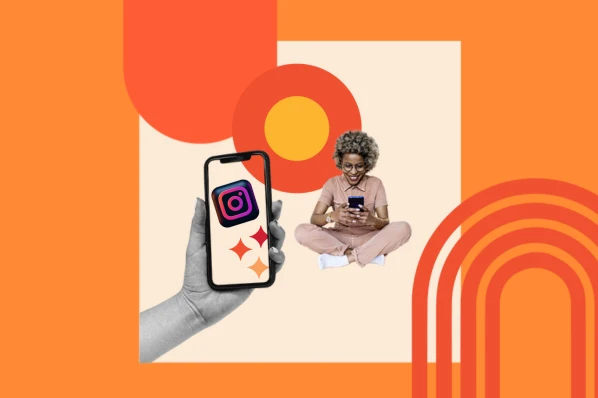
Welcome to Creator Columns, where we bring expert HubSpot Creator voices to the Blogs that inspire and help you grow better.
It’s the age of AI, and our job as marketers is to keep up.
My team at Foundation Marketing recently conducted an AI Marketing study surveying hundreds of marketers, and more than 84% of all leaders, managers, SEO experts, and specialists confirmed that they used AI in the workplace.
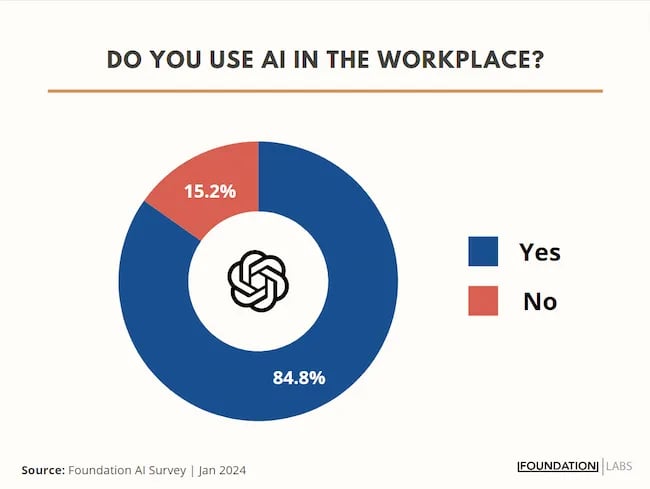
If you can overlook the fear-inducing headlines, this technology is making social media marketers more efficient and effective than ever. Translation: AI is good news for social media marketers.
In fact, I predict that the marketers not using AI in their workplace will be using it before the end of this year, and that number will move closer and closer to 100%.
Social media and AI are two of the most revolutionizing technologies of the last few decades. Social media has changed the way we live, and AI is changing the way we work.
So, I’m going to condense and share the data, research, tools, and strategies that the Foundation Marketing Team and I have been working on over the last year to help you better wield the collective power of AI and social media.
Let’s jump into it.
What’s the role of AI in social marketing strategy?
In a recent episode of my podcast, Create Like The Greats, we dove into some fascinating findings about the impact of AI on marketers and social media professionals. Take a listen here:
Let’s dive a bit deeper into the benefits of this technology:
Benefits of AI in Social Media Strategy
AI is to social media what a conductor is to an orchestra — it brings everything together with precision and purpose. The applications of AI in a social media strategy are vast, but the virtuosos are few who can wield its potential to its fullest.
AI to Conduct Customer Research
Imagine you’re a modern-day Indiana Jones, not dodging boulders or battling snakes, but rather navigating the vast, wild terrain of consumer preferences, trends, and feedback.
This is where AI thrives.
Using social media data, from posts on X to comments and shares, AI can take this information and turn it into insights surrounding your business and industry. Let’s say for example you’re a business that has 2,000 customer reviews on Google, Yelp, or a software review site like Capterra.
Leveraging AI you can now have all 2,000 of these customer reviews analyzed and summarized into an insightful report in a matter of minutes. You simply need to download all of them into a doc and then upload them to your favorite Generative Pre-trained Transformer (GPT) to get the insights and data you need.
But that’s not all.
You can become a Prompt Engineer and write ChatGPT asking it to help you better understand your audience. For example, if you’re trying to come up with a persona for people who enjoy marathons but also love kombucha you could write a prompt like this to ChatGPT:

The response that ChatGPT provided back is quite good:
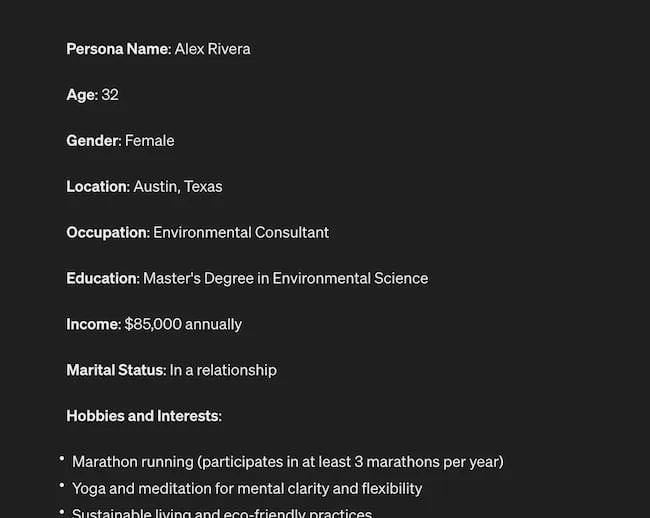
Below this it went even deeper by including a lot of valuable customer research data:
- Demographics
- Psychographics
- Consumer behaviors
- Needs and preferences
And best of all…
It also included marketing recommendations.
The power of AI is unbelievable.
Social Media Content Using AI
AI’s helping hand can be unburdening for the creative spirit.
Instead of marketers having to come up with new copy every single month for posts, AI Social Caption generators are making it easier than ever to craft catchy status updates in the matter of seconds.
Tools like HubSpot make it as easy as clicking a button and telling the AI tool what you’re looking to create a post about:
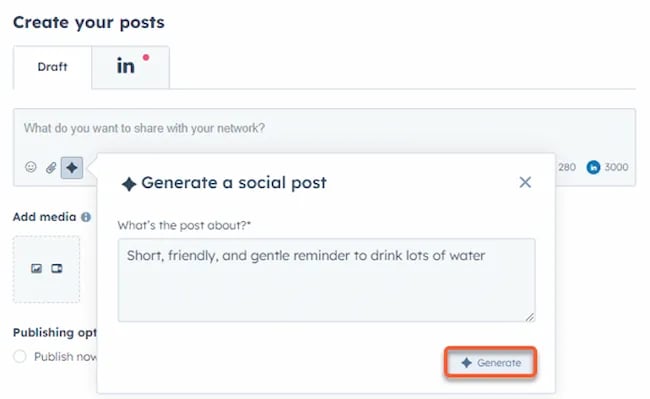
The best part of these AI tools is that they’re not limited to one channel.
Your AI social media content assistant can help you with LinkedIn content, X content, Facebook content, and even the captions that support your post on Instagram.
It can also help you navigate hashtags:
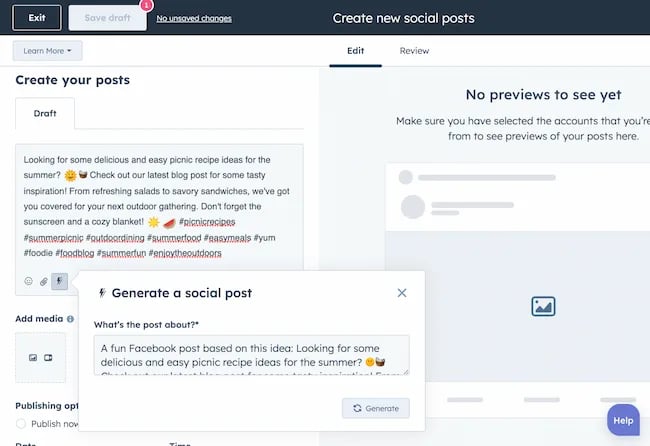
With AI social media tools that generate content ideas or even write posts, it’s not about robots replacing humans. It’s about making sure that the human creators on your team are focused on what really matters — adding that irreplaceable human touch.
Enhanced Personalization
You know that feeling when a brand gets you, like, really gets you?
AI makes that possible through targeted content that’s tailored with a level of personalization you’d think was fortune-telling if the data didn’t paint a starker, more rational picture.
What do I mean?
Brands can engage more quickly with AI than ever before. In the early 2000s, a lot of brands spent millions of dollars to create social media listening rooms where they would hire social media managers to find and engage with any conversation happening online.
Thanks to AI, brands now have the ability to do this at scale with much fewer people all while still delivering quality engagement with the recipient.
Analytics and Insights
Tapping into AI to dissect the data gives you a CSI-like precision to figure out what works, what doesn’t, and what makes your audience tick. It’s the difference between guessing and knowing.
The best part about AI is that it can give you almost any expert at your fingertips.
If you run a report surrounding the results of your social media content strategy directly from a site like LinkedIn, AI can review the top posts you’ve shared and give you clear feedback on what type of content is performing, why you should create more of it, and what days of the week your content is performing best.
This type of insight that would typically take hours to understand.
Now …
Thanks to the power of AI you can upload a spreadsheet filled with rows and columns of data just to be met with a handful of valuable insights a few minutes later.
Improved Customer Service
Want 24/7 support for your customers?
It’s now possible without human touch.
Chatbots powered by AI are taking the lead on direct messaging experiences for brands on Facebook and other Meta properties to offer round-the-clock assistance.
The fact that AI can be trained on past customer queries and data to inform future queries and problems is a powerful development for social media managers.
Advertising on Social Media with AI
The majority of ad networks have used some variation of AI to manage their bidding system for years. Now, thanks to AI and its ability to be incorporated in more tools, brands are now able to use AI to create better and more interesting ad campaigns than ever before.
Brands can use AI to create images using tools like Midjourney and DALL-E in seconds.
Brands can use AI to create better copy for their social media ads.
Brands can use AI tools to support their bidding strategies.
The power of AI and social media is continuing to evolve daily and it’s not exclusively found in the organic side of the coin. Paid media on social media is being shaken up due to AI just the same.
How to Implement AI into Your Social Media Strategy
Ready to hit “Go” on your AI-powered social media revolution?
Don’t just start the engine and hope for the best. Remember the importance of building a strategy first. In this video, you can learn some of the most important factors ranging from (but not limited to) SMART goals and leveraging influencers in your day-to-day work:
The following seven steps are crucial to building a social media strategy:
- Identify Your AI and Social Media Goals
- Validate Your AI-Related Assumptions
- Conduct Persona and Audience Research
- Select the Right Social Channels
- Identify Key Metrics and KPIs
- Choose the Right AI Tools
- Evaluate and Refine Your Social Media and AI Strategy
Keep reading, roll up your sleeves, and follow this roadmap:
1. Identify Your AI and Social Media Goals
If you’re just dipping your toes into the AI sea, start by defining clear objectives.
Is it to boost engagement? Streamline your content creation? Or simply understand your audience better? It’s important that you spend time understanding what you want to achieve.
For example, say you’re a content marketing agency like Foundation and you’re trying to increase your presence on LinkedIn. The specificity of this goal will help you understand the initiatives you want to achieve and determine which AI tools could help you make that happen.
Are there AI tools that will help you create content more efficiently? Are there AI tools that will help you optimize LinkedIn Ads? Are there AI tools that can help with content repurposing? All of these things are possible and having a goal clearly identified will help maximize the impact. Learn more in this Foundation Marketing piece on incorporating AI into your content workflow.
Once you have identified your goals, it’s time to get your team on board and assess what tools are available in the market.
Recommended Resources:
2. Validate Your AI-Related Assumptions
Assumptions are dangerous — especially when it comes to implementing new tech.
Don’t assume AI is going to fix all your problems.
Instead, start with small experiments and track their progress carefully.
3. Conduct Persona and Audience Research
Social media isn’t something that you can just jump into.
You need to understand your audience and ideal customers. AI can help with this, but you’ll need to be familiar with best practices. If you need a primer, this will help:
Once you understand the basics, consider ways in which AI can augment your approach.
4. Select the Right Social Channels
Not every social media channel is the same.
It’s important that you understand what channel is right for you and embrace it.
The way you use AI for X is going to be different from the way you use AI for LinkedIn. On X, you might use AI to help you develop a long-form thread that is filled with facts and figures. On LinkedIn however, you might use AI to repurpose a blog post and turn it into a carousel PDF. The content that works on X and that AI can facilitate creating is different from the content that you can create and use on LinkedIn.
The audiences are different.
The content formats are different.
So operate and create a plan accordingly.
Recommended Tools and Resources:
5. Identify Key Metrics and KPIs
What metrics are you trying to influence the most?
Spend time understanding the social media metrics that matter to your business and make sure that they’re prioritized as you think about the ways in which you use AI.
These are a few that matter most:
- Reach: Post reach signifies the count of unique users who viewed your post. How much of your content truly makes its way to users’ feeds?
- Clicks: This refers to the number of clicks on your content or account. Monitoring clicks per campaign is crucial for grasping what sparks curiosity or motivates people to make a purchase.
- Engagement: The total social interactions divided by the number of impressions. This metric reveals how effectively your audience perceives you and their readiness to engage.
Of course, it’s going to depend greatly on your business.
But with this information, you can ensure that your AI social media strategy is rooted in goals.
6. Choose the Right AI Tools
The AI landscape is filled with trash and treasure.
Pick AI tools that are most likely to align with your needs and your level of tech-savviness.
For example, if you’re a blogger creating content about pizza recipes, you can use HubSpot’s AI social caption generator to write the message on your behalf:

The benefit of an AI tool like HubSpot and the caption generator is that what at one point took 30-40 minutes to come up with — you can now have it at your fingertips in seconds. The HubSpot AI caption generator is trained on tons of data around social media content and makes it easy for you to get inspiration or final drafts on what can be used to create great content.
Consider your budget, the learning curve, and what kind of support the tool offers.
7. Evaluate and Refine Your Social Media and AI Strategy
AI isn’t a magic wand; it’s a set of complex tools and technology.
You need to be willing to pivot as things come to fruition.
If you notice that a certain activity is falling flat, consider how AI can support that process.
Did you notice that your engagement isn’t where you want it to be? Consider using an AI tool to assist with crafting more engaging social media posts.
Make AI Work for You — Now and in the Future
AI has the power to revolutionize your social media strategy in ways you may have never thought possible. With its ability to conduct customer research, create personalized content, and so much more, thinking about the future of social media is fascinating.
We’re going through one of the most interesting times in history.
Stay equipped to ride the way of AI and ensure that you’re embracing the best practices outlined in this piece to get the most out of the technology.
-

 PPC6 days ago
PPC6 days ago19 Best SEO Tools in 2024 (For Every Use Case)
-
SEARCHENGINES5 days ago
Daily Search Forum Recap: April 19, 2024
-
SEARCHENGINES7 days ago
Daily Search Forum Recap: April 18, 2024
-

 WORDPRESS6 days ago
WORDPRESS6 days agoHow to Make $5000 of Passive Income Every Month in WordPress
-

 SEO7 days ago
SEO7 days ago2024 WordPress Vulnerability Report Shows Errors Sites Keep Making
-

 WORDPRESS7 days ago
WORDPRESS7 days ago10 Amazing WordPress Design Resouces – WordPress.com News
-

 SEO6 days ago
SEO6 days ago25 WordPress Alternatives Best For SEO
-

 WORDPRESS5 days ago
WORDPRESS5 days ago7 Best WooCommerce Points and Rewards Plugins (Free & Paid)




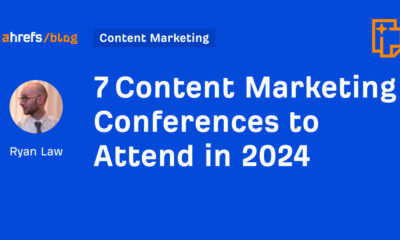









![How to Use AI For a More Effective Social Media Strategy, According to Ross Simmonds Download Now: The 2024 State of Social Media Trends [Free Report]](https://articles.entireweb.com/wp-content/uploads/2024/04/How-to-Use-AI-For-a-More-Effective-Social-Media.png)
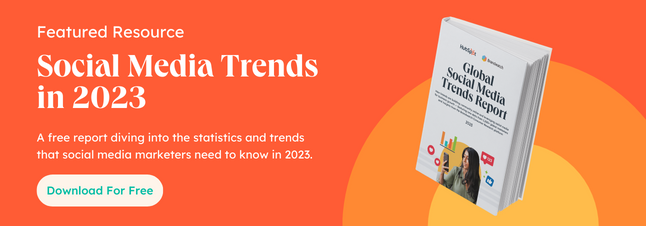


You must be logged in to post a comment Login